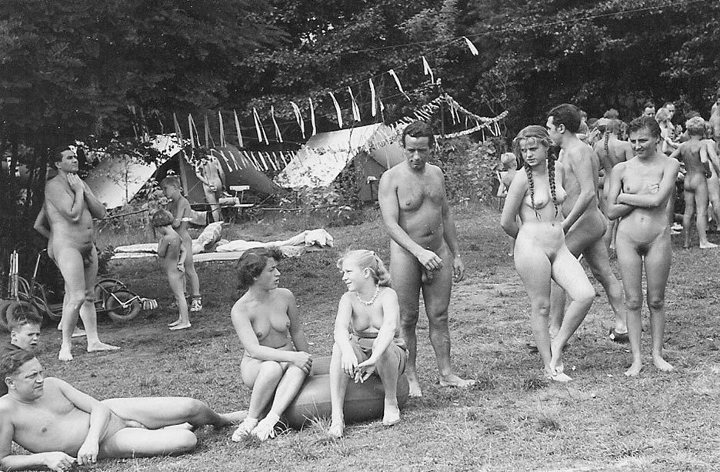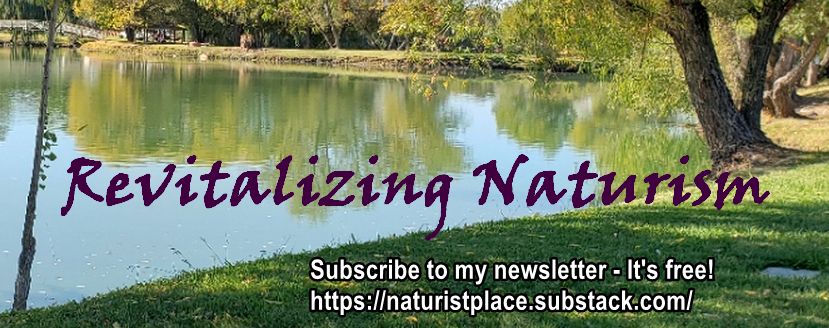- It’s ‘Work Naked Wednesday’!
Yeah. Don’t we wish? Are there any enthusiastic naturists who haven’t at some time or other imagined being able to work naked at their regular job? Sadly, unless you work at a naturist resort or as a dancer at a strip club, or… well, there obviously are a few other jobs where clothes aren’t required. Back in the real world, however, working naked at your job requires being able to work from home – assuming others there are OK with that. Now, suddenly, many (if they’re fortunate to still be employed) are actually able to live that dream. Maybe you’re one of them!
Apparently it was the British Naturism organization that decided – with tongue firmly in cheek – to officially designate every Wednesday as the appointed day for working naked. We may suppose that was, at minimum, a good idea for attracting attention to naturist ways of thinking. However, if you’re now working at home, at least for the present, why shouldn’t every day be good for working naked? One doesn’t need to be Albert Einstein or Winston Churchill (who, according to reports, actually did that) to figure this out.
If you have friends you think might like the idea, feel free to invite them to join in. Even if few in fact take up the suggestion, it could lead to some “interesting” conversations. If nothing else, it gives you a way to let selected friends know how you feel about wearing clothes (or not). As a subsequent post at the British Naturism site observes, “At our events, we’re seeing a huge increase in friends booking together and people bringing members of their family. So, if you are in the workplace and want to embrace #WorkNakedWednesday, then go ahead and see who will join you.”
More about this from the Irish Naturist Association
- Why I teach naked yoga

Well, guess what? Here’s an actual, legal, real-world job that’s done wearing nothing – and gets paid for – with others watching! (Nude modeling for amateur and professional artists – and, of course, working at a naturist resort – are similar jobs.)
Caroline, the yoga teacher who wrote the article explains,
“I get asked a lot why I teach naked yoga and why I enjoy being naked. Very often it’s asked with a slight tone of disdain or incredulity. My answer – because it feels fun and exciting to be naked, because I feel better about my body when I’m naked, because I feel more connected to and more compassion for others when I am naked. The deeper reasons for why this is the case, I’m not acutely aware of. The fact that it feels good is reason enough for me.”
It’s a perfectly adequate explanation for anyone who enjoys nudity – naturists especially. No further justification at all is needed. Nobody should feel embarrassed to admit this. But it’s also OK to mention other reasons, such as reduction of stress, improved body acceptance, and the pleasure of socializing naked with others.
- Strip Off For The Best Nude Beaches In The World

Articles attempting to recommend the “best” examples of almost any category you might think of aren’t in short supply. This is especially true with regard to travel and vacation destinations. That makes sense, because people are always interested in experiencing something new (to them) and different. And few have the time and wherewithal to go out and make the comparisons themselves. Indeed, many of the articles of this sort you might come across are based mainly on the subjective experiences of the writers who may have sampled only a few of the alternatives – selected for who-knows-what reasons.
These limitations certainly apply to recommendations for the “best” clothing-optional beaches around the world. It’s a difficult problem, especially, for nudity-friendly beaches. Many of them aren’t well-known outside of their local area – because regular users want to keep it that way. Too much popularity of any potential travel destination – let alone one where nudity is the norm – may well not be a great thing for the ambiance.
And besides, who has been fortunate enough to sample most of the possibilities? But luckily, there’s a travel advisory organization named Globehunters that’s approached the task systematically. Their effort has already been noted here.
This approach uses mostly objective factors such as average summer temperature, hours of sunshine, cost of accommodations, and a “safety” index. That’s instead of more subjective factors, such as friendliness of other beach users, scenic views, ease of access, and lack of gawkers. There are clearly both pros and cons of this approach, but at least it’s potentially able to cover a larger sample of beaches.
Obviously, this year is not a good one for long-distance travel. But if you want to make travel plans for the future, the Globehunters’ list gives you a wide range of alternatives (45) to consider. Naturists will also want to investigate other clothing-optional opportunities in the general area of each alternative.
- Haulover Beach for the First Time: A Naturist Woman’s Perspective

Linda W., a seasoned California naturist, writes about Haulover Beach in Miami, Florida, which she visited because it “came highly recommended by friends who ironically, were on an extended stay in Florida from the United Kingdom. They raved about what a nice beach it was.” The clothing-optional part of Haulover, of course, is one of the best and most well-known nude beaches in the U. S. It has many fine points, such as great climate, friendly naturist users, and an active support organization, on whose blog this article appeared. That blog and Linda’s article provide just about all the information anyone might want to learn about the beach.
Although Linda writes from a “woman’s perspective” the message is basically that Haulover is a great, safe place for a woman (or anyone, really) to give naturism a good and carefree try. “It is a haven for people who want to enjoy a clothes-free relaxing day,” she writes, since “if there are unwarranted activities such as sex, drinking or drug use noted, people will say something.” In summary, “As a female naturist, I felt safe enough to walk the beach by myself without anyone hitting on me or making me feel uncomfortable.”
- The Nude Selfie Is Now High Art
People who write for the New York Times tend not to be especially tuned in to naturist ways of thinking. And often not even to current social trends among people of the “Millennial” generation – let alone the “Gen Z” cohort. Thus the writer here begins:
“[N]ude selfies have become one symbol of resilience, a refusal to let social distancing render us sexless. Nude selfies are no longer foreplay, a whetting of a lover’s appetite, but the whole meal. Though the debate about art versus pornography has never been settled, a case can be made that quarantine nude selfies are art. Some of us finally have time to make art, and this is the art we are making: carefully posed, cast in shadows, expertly filtered. These aren’t garish below-the-belt shots under fluorescent lighting, a half-used roll of toilet paper in the background. They are solicited or spontaneous. They are gifts to partners in separate quarantines, friends who aren’t exactly friends, unmet Hinge matches and exes.”
We can’t know what’s actually on the mind of people nowadays who exchange naked pictures of themselves. Do they honestly think what they’re doing is art? (Although sometimes it is.) Or now, in this period of social distancing, are they just especially sex-starved and horny, regarding the exchange of naked selfies as simply an enhanced form of phone sex? (Not even considering the use of things like Zoom.)
But why does this kind of activity need to be considered either “art” or sexual at all? In fact, ever since the advent of smartphones with cameras, it’s become much more common – among people of college-age or later (and many who are younger as well) – to exchange naked selfies as a way of saying “I like you and want to share some of myself with you in this way.” This is definitely not about dick pics and crotch shots – stuff like that is just plain rude and crude in most cases. For many people – how many is not knowable – it’s really much more like a naturist attitude: “There’s nothing wrong or embarrassing about nudity. It’s just fine to share nudity among friends.”
To be perfectly clear, there certainly does need to be lots of caution associated with this activity – especially for young women or anyone who expects to go into a career such as politics or pre-college teaching. It shouldn’t be done without careful consideration of the circumstances. Especially in countries (and many U. S. states) that are backward and not really part of the modern world. People who exchange naked selfies need to ask themselves: “Would the consequences be devastating if my pictures went farther than I intended?”
Already, after a couple of months of enforced isolation, younger people – at least those not in long-term, monogamous relationships – are becoming more relaxed about and accepting of the idea that sharing nudity with friends is a wholesome, salutary thing. Naturists should hope that this idea will persist long beyond the duration of the present unpleasantness.
- Naturist Lock Down Idea #2 – Read and Share Naturist Magazines

Marc at the Nude & Happy blog is a maker of lists of ideas related to naturism, and the lastest offers ideas for how naturists can continue to enjoy their lifestyle even when (mostly) confined to home because of the pandemic. (Idea #4 briefly covers video chatting with other naturists.) Idea #2 reminds us that information about naturism isn’t available only online, but is also still available in the venerable printed magazine format. Indeed, there are a surprising number of such publications still, which is remarkable in itself, as many printed publications are either going to digital-only form or actually into extinction.
Marc names ten periodicals. The majority are in English. (Every major English-speaking nation seems to have at least one of its own.) Two, however, are in French, and one is German. (Among those mentioned – there must be others.) There are pros and cons to both print and digital format. Digital is fine if all you want is to scan the articles, and perhaps read a few, on your computer or smartphone. But the printed form has definite advantages. Printed copies are better for taking with you to read at your favorite camp or beach, sharing with others, or leaving out on your coffee table to stimulate discussions about naturism with guests.
You might be surprised how effective naturist magazines can be with open-minded people. I first became aware of, and interested in, naturism from just seeing a naturist magazine at a newsstand while in college, eons ago. Sadly, there are many fewer such newsstands today, and almost none (at least in the U. S.) dare to carry naturist publications.
Why bother reading about naturism at all? Isn’t the whole point just being able to enjoy life without clothes when that’s possible and comfortable? Mark responds with 3 good points:
- “Nudity is an integral part of naturism but naturism cannot be limited to nudity. This means there are tons on topic that naturism can relate too: psychology, family, nature, well-being, health, food, etc.”
- “[T]he naturist movement has federations, clubs, and resorts. A magazine is a great opportunity to talk about them, promote them and explain the positive economic impact of naturism on local economies.”
- “[M]agazines are a great way to reach out to curious people, to new naturists who have questions about the lifestyle. They provide a wonderful way to make people aware about naturism, [and] its various benefits and locations.”
- Preserving Nudist History: An Interview with NaturistVintage – Part Two

This is the second half of an interview with a collector of vintage naturist magazines – typically from the early days of naturism in the middle of the previous century. (The first part is here.) The collector’s great great grandfather was a prominent naturist back then, and his interest clearly percolated to later generations. The collector now has a popular account on Twitter: Naturist Vintage, where many scans of images and pages from vintage magazines are offered.
Naturism (or nudism, as it used to be called) has changed considerably in recent decades, although much is still the same – the way being non-sexually naked can enhance a person’s life. These glimpses of naturist history give us some idea of both what has changed and what hasn’t. Interestingly, naturists back then seem, if anything, less inhibited, circumspect, or embarrassed about their nudity than naturists today. But maybe that’s because nudity then was confined to private homes and campgrounds, where prudish, judgmental people never ventured. None of these vintage magazines is still published (AFAIK).
Two remarks from this part of the interview seemed particularly interesting to me. First, “I think it’s all the more important for people to be exposed to non-sexual nudity (pun intended). Being nude around other people and seeing other people nude, with all their beautiful imperfections, can demystify the body, which so often gets objectified in our culture.”
That observation, I believe, can’t be emphasized nearly as much as it needs to be. It’s extremely important for people to see and become accustomed to seeing (non-sexual) nudity. By continuing to treat images of explicit – and I include full-frontal – nudity to be considered so taboo and controversial, a vicious circle is established. Because such nudity is so seldom seen, the idea is perpetuated that it shouldn’t be seen. Everyday nudity can never be considered normal if it’s (almost) never seen in a positive light. Seeing only the backsides of naked people isn’t enough. The implied message that people are (or should be) ashamed to be seen naked from the front is toxic for naturism.
Just ask yourself this: If non-naturists cannot become accustomed to seeing full nudity, then why is it that many people still are able to enjoy – without apparent distress – sketching and painting nudes in art classes, mingling with naked people at clothing-optional beaches, or watching naked cyclists at World Naked Bike Rides? And yet explicit pictures of naked people like that are a problem? WTF?
The second prescient remark from the interview is this: “[O]ne thing that amazes me about reading magazines from the 1930s, ’40s, and ’50s is how much of the debate around nudism has not changed in the years since. Some of the issues they dealt with, such as maintaining a gender balance, or managing the understanding of non-nudists, are still in many ways the same.”
Yes, quite a lot is still the same. But change for the better is possible and does happen sometimes. We do have World Naked Bike Rides now, naked bodypainting in New York’s Times Square, well-attended performances by naked magicians and comedians, naked theatrical productions, and a (small but increasing) number of naked yoga classes here and there.








